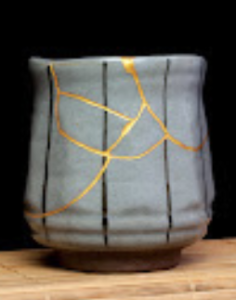WABI-SABI
It got me thinking about the negatives I experienced by wanting to be perfect: I wouldn’t try something if I thought I might not be good at it; It took me longer to do tasks; I would throw out good projects because they had a minor flaw. While I still strove to be perfect, there were times Icould recognize this was holding me back and take steps to move forward.
Years later I discovered wabi-sabi. As Kiyoshi Matsuomoto describes it, “Wabi-sabi is Japanese acceptance of imperfections as both meaningful and in their own way, beautiful.” The philosophy embraces that nothing lasts, nothing is finished, and nothing is perfect.
Kintsugi is a process of mending broken bowls with gold epoxy, which highlights the imperfection rather than disguises it. It is the physical demonstration of the wabi-sabi. It became so popular in Japan at one time that potters would intentionally break a piece of pottery they had just made in order to gild it in this manner.
Discovering this concept, and admiring the beautiful pottery, I have been able to incorporate it into my own experience. A fellow cardmaker, blaming her left-handedness, often makes a mistake on her card such as getting ink where it wasn’t intended. Instead of getting upset, she laughs and says, “At least the person I give it to will know it’s handmade by me.” I look at such mistakes I make as opportunities to add an embellishment creating the card into more than I originally intended.
Rev. Dr. Michael Gott wrote in a recent SOM Magazine, “We are human and we are divine. Can we finally…recognize and honor that our humanity is divine?” and, as John Legend sings, “love all your perfect imperfections.”
The student of Truth will maintain that they live in a Perfect Universe and among people potentially perfect. They will regulate their thinking to meet this necessity and will refuse to believe its opposite. At first they may be influenced by conditions, and they may appear to be weak, but as time goes on they will prove to themself that their position is a correct one, for that which appears imperfect will begin to slip from their experience. SOM 185.1
–Janet Salese





